人教版英语七年级下册 Unit 12 What did you do last weekend?复习课件(共44张PPT)
文档属性
| 名称 | 人教版英语七年级下册 Unit 12 What did you do last weekend?复习课件(共44张PPT) | 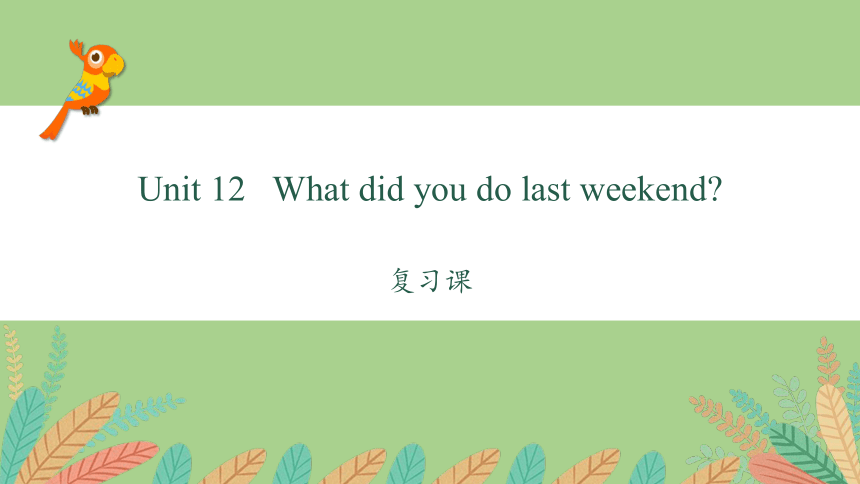 | |
| 格式 | zip | ||
| 文件大小 | 1.8MB | ||
| 资源类型 | 教案 | ||
| 版本资源 | 人教新目标(Go for it)版 | ||
| 科目 | 英语 | ||
| 更新时间 | 2021-06-19 10:58:41 | ||
图片预览

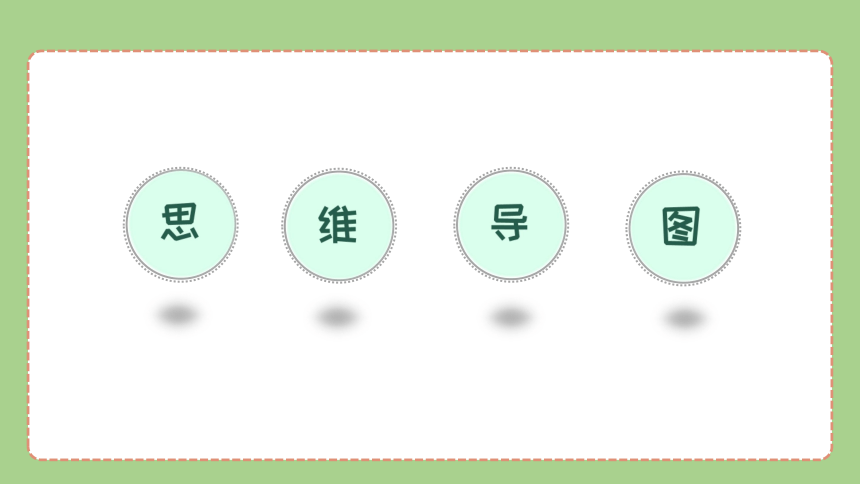
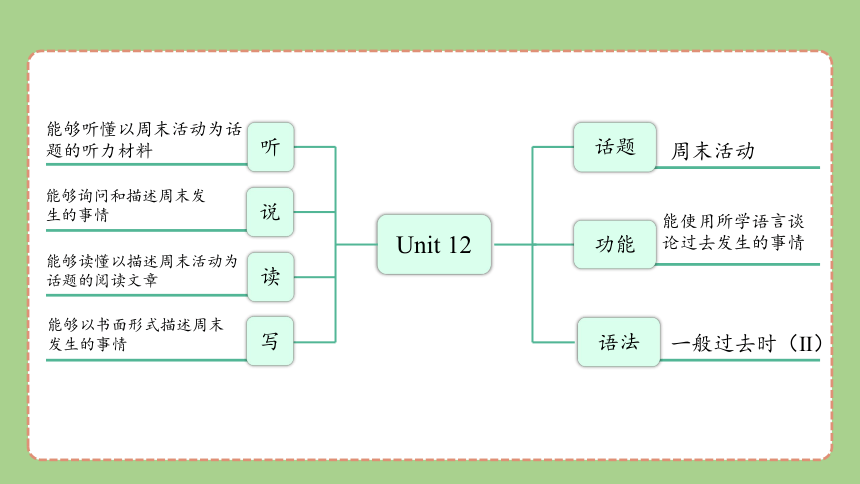
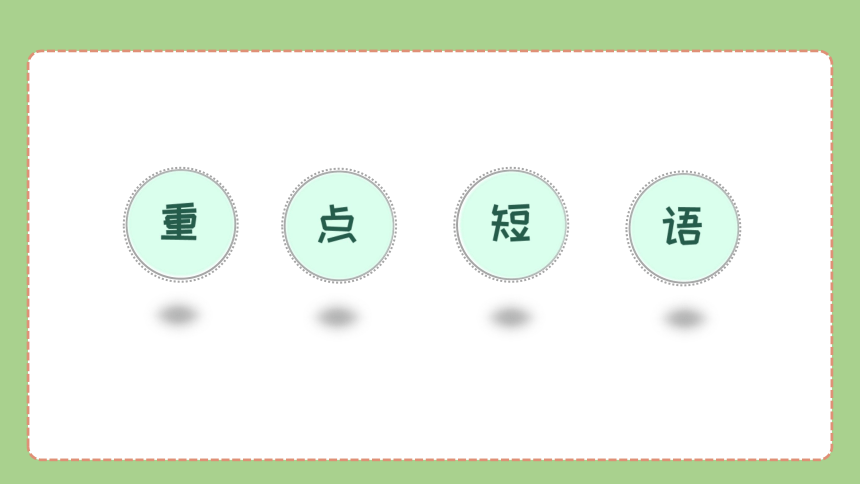
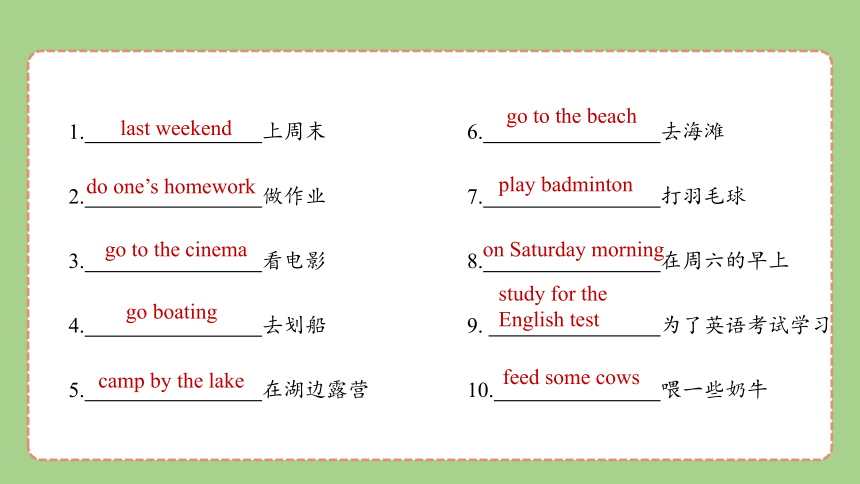
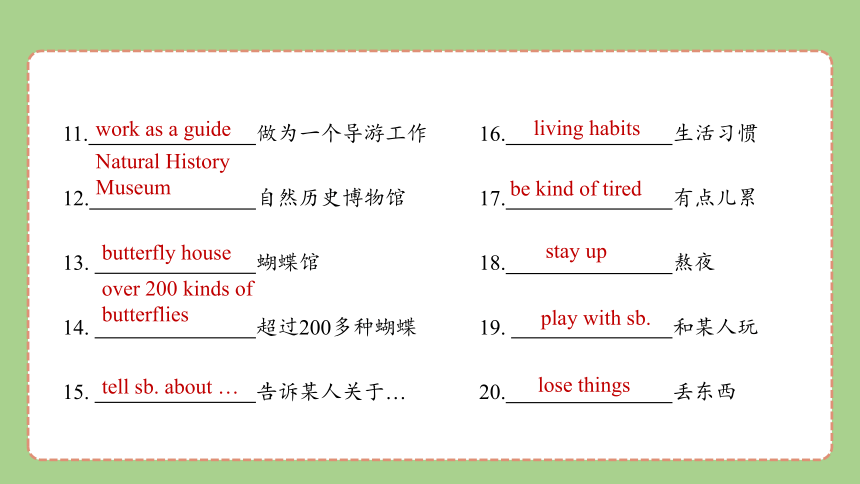
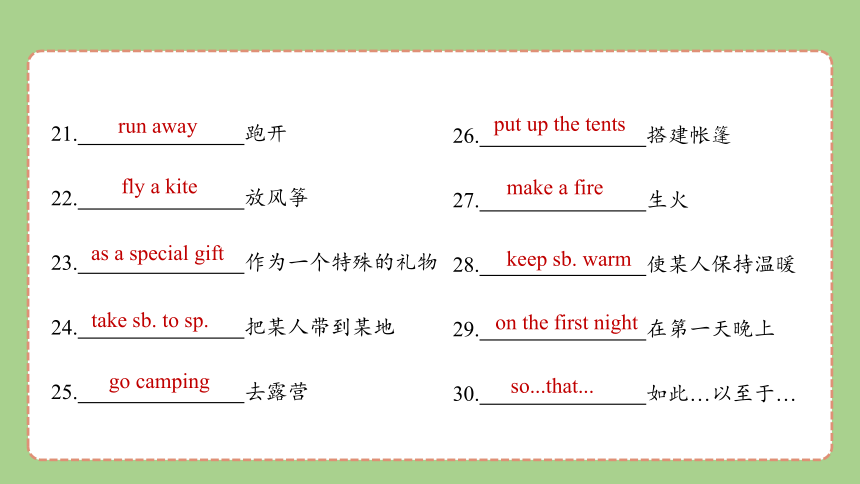
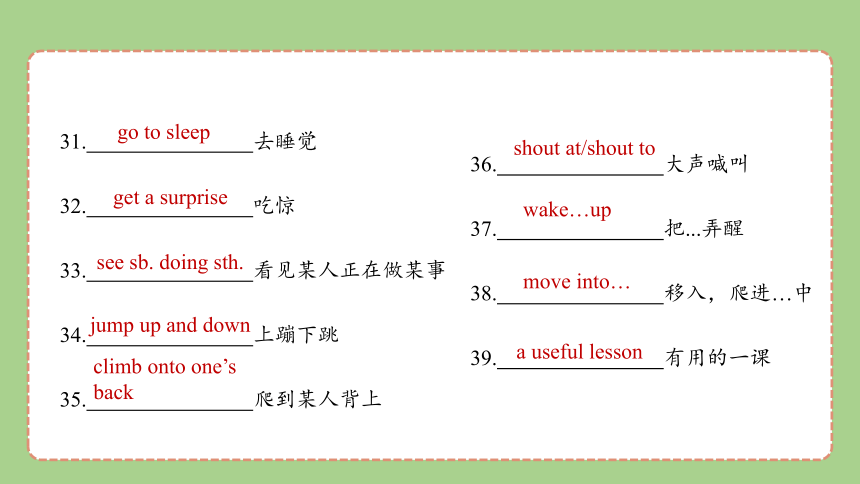
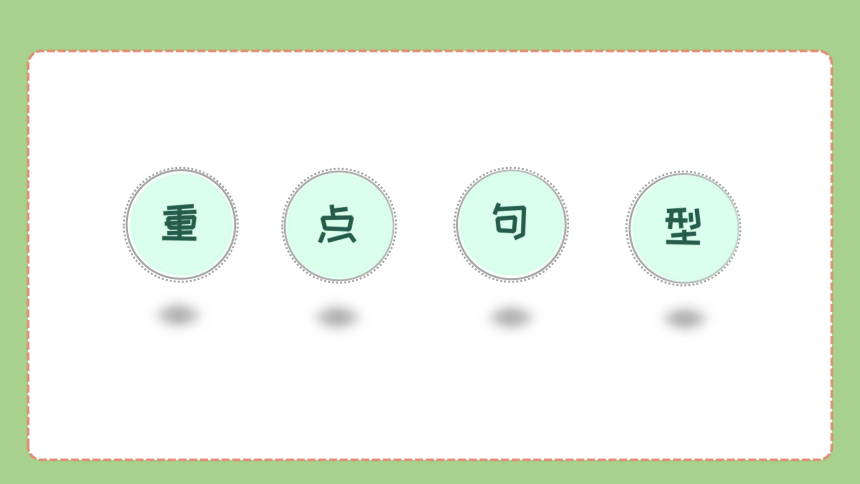
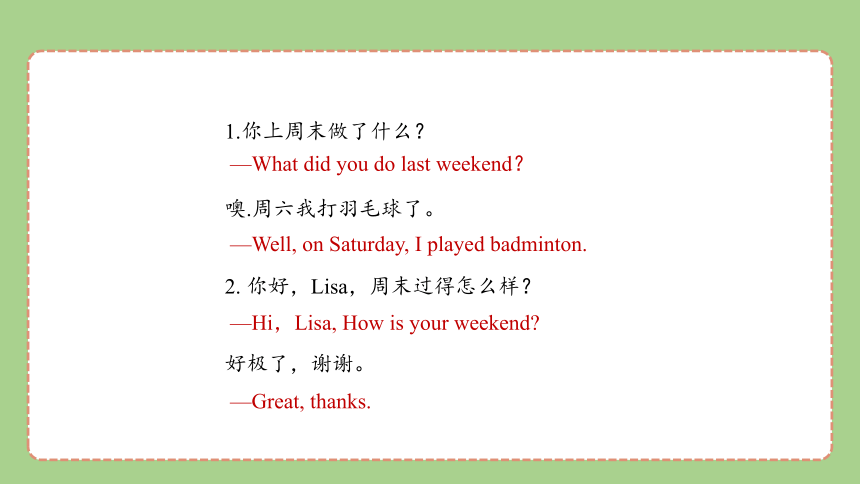
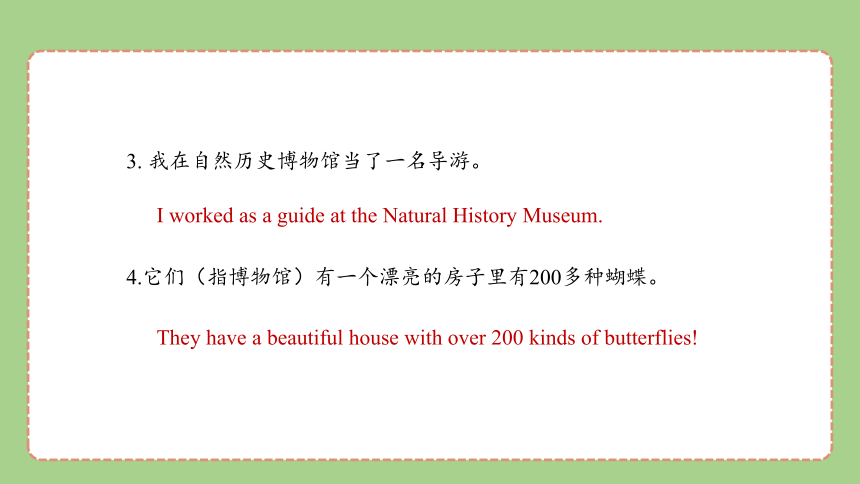
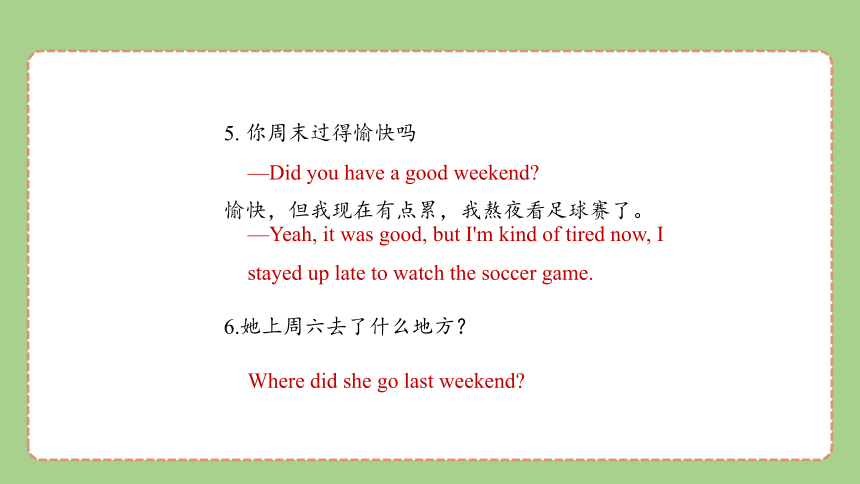
文档简介
(共44张PPT)
Unit
12
What
did
you
do
last
weekend?
复习课
一般过去时(Ⅱ)
能使用所学语言谈论过去发生的事情
周末活动
Unit
12
话题
功能
语法
听
说
读
写
能够听懂以周末活动为话题的听力材料
能够询问和描述周末发生的事情
能够读懂以描述周末活动为话题的阅读文章
能够以书面形式描述周末发生的事情
1.
上周末
2.
做作业
3.
看电影
4.
去划船
5.
在湖边露营
6.
去海滩
7.
打羽毛球
8.
在周六的早上
9.
为了英语考试学习
10.
喂一些奶牛
last
weekend
do
one’s
homework
go
to
the
cinema
go
boating
camp
by
the
lake
go
to
the
beach
play
badminton
on
Saturday
morning
study
for
the
English
test
feed
some
cows
11.
做为一个导游工作
12.
自然历史博物馆
13.
蝴蝶馆
14.
超过200多种蝴蝶
15.
告诉某人关于…
16.
生活习惯
17.
有点儿累
18.
熬夜
19.
和某人玩
20.
丢东西
work
as
a
guide
Natural
History
Museum
butterfly
house
over
200
kinds
of
butterflies
tell
sb.
about
…
living
habits
be
kind
of
tired
stay
up
play
with
sb.
lose
things
21.
跑开
22.
放风筝
23.
作为一个特殊的礼物
24.
把某人带到某地
25.
去露营
26.
搭建帐篷
27.
生火
28.
使某人保持温暖
29.
在第一天晚上
30.
如此…以至于…
run
away
fly
a
kite
as
a
special
gift
take
sb.
to
sp.
go
camping
put
up
the
tents
make
a
fire
keep
sb.
warm
on
the
first
night
so...that...
31.
去睡觉
32.
吃惊
33.
看见某人正在做某事
34.
上蹦下跳
35.
爬到某人背上
36.
大声喊叫
37.
把...弄醒
38.
移入,爬进…中
39.
有用的一课
go
to
sleep
get
a
surprise
see
sb.
doing
sth.
jump
up
and
down
climb
onto
one’s
back
shout
at/shout
to
wake…up
move
into…
a
useful
lesson
1.你上周末做了什么?
噢.周六我打羽毛球了。
2.
你好,Lisa,周末过得怎么样?
好极了,谢谢。
—What
did
you
do
last
weekend?
—Well,
on
Saturday,
I
played
badminton.
—Hi,Lisa,
How
is
your
weekend?
—Great,
thanks.
3.
我在自然历史博物馆当了一名导游。
4.它们(指博物馆)有一个漂亮的房子里有200多种蝴蝶。
I
worked
as
a
guide
at
the
Natural
History
Museum.
They
have
a
beautiful
house
with
over
200
kinds
of
butterflies!
5.
你周末过得愉快吗
愉快,但我现在有点累,我熬夜看足球赛了。
6.她上周六去了什么地方?
—Did
you
have
a
good
weekend?
—Yeah,
it
was
good,
but
I'm
kind
of
tired
now,
I
stayed
up
late
to
watch
the
soccer
game.
Where
did
she
go
last
weekend?
7.
她去了一家农场。
8.
他是什么吋候丢的钥匙?
我听说是咋天。
9.
作为一份特殊的礼物我爸妈带着我们去了印度。
She
went
to
a
farm.
—When
did
he
lose
them?
—I
heard
it
was
yesterday.
As
a
special
gift,
our
parents
took
us
to
India.
10.
所以嘛,儿子,这就是为什么学习外语的重要性啦。
11.
在那里我们架起帐篷,生火取暖并做饭。
Well,
son,that’s
why
it's
important
to
learn
a
second
language.
There
we
put
up
tents
and
made
afire
to
keep
us
warm
and
cook
food
on.
last
1.last
作形容词时,意为“最后的,最末的”或者“紧接前面的,刚过去的”。
e.g.
Today
is
the
last
day
in
the
year.
I
didn’t
sleep
well
last
night.
2.last作副词时,意为“最后地”,
e.g.
I’m
the
last
one.
3.last
做动词时,意思是“持续,继续,维持”等,
e.g.
The
hot
weather
lasted
a
week.
as
1.as作介词时意为“作为”,其后多接表示职业、职务、用途、作用之类的名词。
e.g.
He
works
as
a
worker.
I
used
one
of
my
shoes
as
a
hammer.
2.as还可以作连词,其后多接从句或介词短语。
e.g.
All
the
six
students
do
as
the
teacher
says.
camp
1.camp
作动词,意为“扎营,搭帐篷”。
e.g.
We
go
camping
every
summer.
We
walked
all
day
and
camped
by
a
river
at
night.
2.camp
作名词,意为“露营地,度假营”。
e.g.
Let’s
go
back
to
the
camp,
it’s
getting
dark.
We
spent
two
weeks
at
camp
this
summer.
sheep
sheep
可数名词,意为“绵羊”,它的复数还是sheep;而goat侧重指山羊。
e.g.
How
many
sheep
are
there
on
your
farm?
常见的单复数同形的名词还有:
deer
(鹿),
fish
(鱼),
Chinese
(中国人),
Japanese(日本人)等。
by
by介词,
意为“在……旁边”,
表示位置,相当于beside。
e.g.
Our
teacher
is
sitting
by
the
window.
by作介词的其他常见用法:
1.表示移动方向,意为“经过”。
e.g.
My
mother
goes
by
the
building
every
day.
2.表示方式及手段,意为“用,靠,通过”。
e.g.
He
makes
a
living
by
fishing.
3.与交通工具名词连用时,名词前不用冠词,意为“乘、坐、用”等。e.g.
I
went
there
by
bike.
tired
tired
形容词,意为“疲倦的,疲劳的,累的”,be
tired
of
意为“对……厌烦”。tired
的反义词是tireless,意为“不知疲倦的”。
e.g.
He
looks
tired
today.
She
was
tired
of
watching
TV.
她
tiring
指“令人困倦的,使人疲劳的,累人的”。
e.g.
It
was
a
long
tiring
day.
stay
1.stay
不及物动词,意为“停留,逗留”,后常接介词短语表示停留的地点。
stay
up
意为“熬夜;不睡觉”;stay
up
late
意为“熬夜,睡的很晚”。
e.g.
It’s
raining
outside,
so
we
have
to
stay
at
home.
Do
you
often
stay
up?
2.stay
可以做连系动词,意为“维持,保持”,其后常接形容词作表语。
e.g.
The
weather
will
stay
fine
for
several
days.
3.stay
可以作名词,意为“停留、逗留”。
e.g.
During
my
stay
in
Beijing,
I
had
a
good
time.
shout
1.shout
作动词,意为“呼喊(叫),大声说,叫嚷”。shout
at意为“冲……大声嚷”,方式比较粗鲁;shout
to意为“朝……喊”,常因为距离远或者周围嘈杂而喊,目的让对方听见。
e.g.
She
shouted
at
the
old
man.
He
shouted
to
the
old
man.
2.名词,意为“呼喊,叫喊”。
e.g.
What
a
terrible
shout!
put
up
put
up意为“搭建,搭起”,着重指建造或搭起一个具有一定高度的具体的物体。在口语中set
up与build也有此意。
e.g.
It’s
going
to
rain.
Let's
put
up
the
tent.
put
up还可意为“挂起,张贴;举起;抬起”之意。
e.g.
Please
help
me
put
up
the
picture.
If
you
know
the
answer,
please
put
up
your
hands.
surprise
1.surprise
作名词,意为“惊奇,惊讶,
惊喜”,作抽象名词时通常不可数,也可以具体化变为可数名词;get
a
surprise意为“吃惊”。
e.g.
He
gave
me
a
surprise
by
arriving
early.
2.surprise
作动词,意为“使……吃惊/震惊”,后面常接人作宾语。
e.g.
The
news
surprised
us
greatly.
move
move的用法比较多,现总结如下:
1.move可作及物动词,意为“移动、搬动、使改变位置(或姿势)”。e.g.
He
moved
the
sofa
to
the
left.
2.move作及物动词,还可意为“感动、鼓动、激动”。
e.g.
The
speech
moved
them
to
tears.
3.move还可作不及物动词,意为“离开、动身迁移、搬家”。
e.g.
He
moved
his
family
to
a
smaller
house.
move
【注意】搬到某地常用move
to
+
地点,但当副词作地点状语时,此时可省略掉to。
move
house
搬家
move
to
Paris
搬到巴黎
move
in
搬进,迁进
move
on
继续前进
wake
up&wake…up
wake
up
意为“醒来”,是不及物动词词组,其后不能接表示人的名词或者代词。
e.g.
The
students
usually
wake
up
early.
wake
…
up
意为“把某人叫醒”,是指一方把另一方叫醒或者吵醒,wake和up之间加表示人的名词或者代词。
e.g.
Don’t
wake
your
father
up.
He’s
too
tired.
How
interesting!
这是一个感叹句,感叹句是用来表达喜怒哀乐等强烈情感的句子。感叹句一般用how或者what开头,句末加感叹号。what修饰名词,how修饰形容词或副词。具体句式如下:
1.what引导的感叹句:
(1)What
a(an)+形容词+可数名词的单数形式+主语+谓语!
e.g.
What
a
clever
boy
he
is!
(2)What+形容词+可数名词的复数形式+主语+谓语!
e.g.
What
interesting
books
the
children
are
reading!
(3)What+形容词+不可数名词+主语+谓语!
e.g.
What
cold
weather
it
is!
How
interesting!
2.how引导的感叹句:
(1)How+形容词或副词+主语+谓语!
e.g.
How
lovely
the
baby
is!(lovely为形容词)
e.g.
How
fast
he
runs!
(fast为副词)
(2)How+形容词+a(an)+可数名词的单数形式+主语+谓语!
e.g.
How
heavy
a
box
they
are
carrying!
他们抬的箱子多重啊!
(3)How+主语+谓语!
e.g.
How
time
flies!
—Who
visited
her
grandma?
—Becky
did.
本句的答语中的did是用来代替上文中的动词visited的。英语中为了避免不必要的重复,经常用do,
does,
did,
so等来代替前面的动词或相关内容。
e.g.
—Do
you
like
music?
—No,
but
my
father
does.
(does=
likes
music)
—Do
you
think
he
is
clever?
—I
think
so.(so
代替he
is
clever)
—Did
you
pass
the
exam?
—No,
but
my
friend
Lily
did.
(did等于passed
the
exam)
But
I
was
so
tired
that
I
went
to
sleep
early.
这句话的意思是“我是如此的累,以至于我很早就睡了。”;so…
that…的意思是“如此……以至于……”,它引导结果状语从句。在口语中,so…that…的that常被省去。
e.g.
She
felt
so
sad
that
tears
came
to
her
eyes.
John
was
so
drunk(that)he
could
not
stand
still.
He
spoke
so
rapidly(that)we
could
hardly
follow
him.
This
was
a
very
useful
lesson
for
me.
这句话的意思是“这对我来说是个很有用的教训。”。lesson在本句中意为“教训,经验”,是可数名词。teach
sb.
a
lesson表示“给某人一个教训”。learn
a
lesson意为“得到一次教训”。
e.g.
That
accident
taught
them
a
lesson.
You
should
teach
him
a
lesson.
lesson作名词时还可以表示“功课,课”,多用复数形式,也可以指具体的“一堂课,一节课”,多用单数形式。
e.g.
She
gives
the
children
lessons
in
music.
They
usually
have
four
lessons
in
the
morning.
Not
really,
but
I
visited
my
sister.
really是副词,
在此与否定词连用,起减弱语气的作用。not
really意为“没有,没什么,不怎么”等,相当于not
very
much.
e.g.
I
don’t
really
agree
with
that.
—Did
you
enjoy
that
movie?
—Not
really.
really单独使用时,表示感兴趣或疑问、惊讶、恼怒等语气。
e.g.
—My
grandfather
bought
me
a
new
bike.
—Really?
用于形容词或行为动词之前,表示强调,意为“真的,的确,确实”。
e.g.
She
is
really
beautiful.
描述自己或他人的周末发生的事情
能够使用所给内容谈论周末活动
周末活动
单元话题
话题
内容
写作技巧
假如你是李华,请根据表格提示,写一篇60词左右的英文短文,向大家介绍一下你上周的活动,可适当发挥。
星期六上午
去书店买书
星期六下午
去公园打排球
星期天上午
在家写作业
星期天下午
去电影院看电影
上周末活动的感受
具体描述上周末都做了哪些活动
介绍你自己
布局谋篇
开篇点题
展开描述
结尾总述
My
name
is
Li
Hua.
I
had
a
birthday
party
last
Saturday.
Some
of
my
friends
came
to
my
home.
They
gave
me
some
gifts.
The
party
started
at
8:
00
a.
m.
there
.was
a
big
cake
with
twelve
candles
at
the
party.
The
number
of
the
candles
was
my
age.
We
sat
around
the
cake
together.
I
made
a
wish
and
then
blew
out
the
candles
in
one
go.
After
that,
we
sang
and
danced
and
played
games
at
the
party.
All
in
all,
we
had
a
good
time
together.
1.He
____
me
his
name,
but
I
can't
remember
it
now.
A.
tells
B.
will
tell
C.
told
D.
is
telling
2.
____
smart
the
driverless
car
is!
I
really
want
to
have
one.
A.
What
B.
What
a
C.
What
an
D.
How
3.They
had
to
____
their
school
trip
because
of
the
bad
weather.
A.
put
up
B.
put
off
C.
put
away
4.—Xiao
Lin,
this
desk
is
____
heavy
____
I
can't
move
it.
—Don't
worry.
I'll
help
you.
A.
such;
that
B.
too;
to
C.
so;
that
C
D
B
C
5.—____
wonderful
the
music
is!
—Yes.
It
makes
me
relaxed
after
a
busy
day.
A.
How
B.
What
a
C.
How
a
6.—How
was
your
trip
in
the
mountains
last
weekend?
—Fantastic.
We
even
____
a
tent
by
the
lake
and
lay
in
it.
A.
put
on
B.
put
off
C.
put
down
D.
put
up
7.We
have
____
time
that
we
can
finish
the
work
very
well.
A.
such
much
B.
so
many
C.
so
much
D.
such
many
A
D
C
8.
____
my
surprise,
the
twins
have
nothing
____
common.
A.
With;in
B.
To;in
C.
In;in
D.
To;of
9.—Look
at
my
new
smart
phone.
—Wow,
it's
so
cool!
When
and
where
____
you
____
it?
A.
do;
buy
B.
have;
bought
C.
did;
buy
D.
have;
had
B
C
Unit
12
What
did
you
do
last
weekend?
复习课
一般过去时(Ⅱ)
能使用所学语言谈论过去发生的事情
周末活动
Unit
12
话题
功能
语法
听
说
读
写
能够听懂以周末活动为话题的听力材料
能够询问和描述周末发生的事情
能够读懂以描述周末活动为话题的阅读文章
能够以书面形式描述周末发生的事情
1.
上周末
2.
做作业
3.
看电影
4.
去划船
5.
在湖边露营
6.
去海滩
7.
打羽毛球
8.
在周六的早上
9.
为了英语考试学习
10.
喂一些奶牛
last
weekend
do
one’s
homework
go
to
the
cinema
go
boating
camp
by
the
lake
go
to
the
beach
play
badminton
on
Saturday
morning
study
for
the
English
test
feed
some
cows
11.
做为一个导游工作
12.
自然历史博物馆
13.
蝴蝶馆
14.
超过200多种蝴蝶
15.
告诉某人关于…
16.
生活习惯
17.
有点儿累
18.
熬夜
19.
和某人玩
20.
丢东西
work
as
a
guide
Natural
History
Museum
butterfly
house
over
200
kinds
of
butterflies
tell
sb.
about
…
living
habits
be
kind
of
tired
stay
up
play
with
sb.
lose
things
21.
跑开
22.
放风筝
23.
作为一个特殊的礼物
24.
把某人带到某地
25.
去露营
26.
搭建帐篷
27.
生火
28.
使某人保持温暖
29.
在第一天晚上
30.
如此…以至于…
run
away
fly
a
kite
as
a
special
gift
take
sb.
to
sp.
go
camping
put
up
the
tents
make
a
fire
keep
sb.
warm
on
the
first
night
so...that...
31.
去睡觉
32.
吃惊
33.
看见某人正在做某事
34.
上蹦下跳
35.
爬到某人背上
36.
大声喊叫
37.
把...弄醒
38.
移入,爬进…中
39.
有用的一课
go
to
sleep
get
a
surprise
see
sb.
doing
sth.
jump
up
and
down
climb
onto
one’s
back
shout
at/shout
to
wake…up
move
into…
a
useful
lesson
1.你上周末做了什么?
噢.周六我打羽毛球了。
2.
你好,Lisa,周末过得怎么样?
好极了,谢谢。
—What
did
you
do
last
weekend?
—Well,
on
Saturday,
I
played
badminton.
—Hi,Lisa,
How
is
your
weekend?
—Great,
thanks.
3.
我在自然历史博物馆当了一名导游。
4.它们(指博物馆)有一个漂亮的房子里有200多种蝴蝶。
I
worked
as
a
guide
at
the
Natural
History
Museum.
They
have
a
beautiful
house
with
over
200
kinds
of
butterflies!
5.
你周末过得愉快吗
愉快,但我现在有点累,我熬夜看足球赛了。
6.她上周六去了什么地方?
—Did
you
have
a
good
weekend?
—Yeah,
it
was
good,
but
I'm
kind
of
tired
now,
I
stayed
up
late
to
watch
the
soccer
game.
Where
did
she
go
last
weekend?
7.
她去了一家农场。
8.
他是什么吋候丢的钥匙?
我听说是咋天。
9.
作为一份特殊的礼物我爸妈带着我们去了印度。
She
went
to
a
farm.
—When
did
he
lose
them?
—I
heard
it
was
yesterday.
As
a
special
gift,
our
parents
took
us
to
India.
10.
所以嘛,儿子,这就是为什么学习外语的重要性啦。
11.
在那里我们架起帐篷,生火取暖并做饭。
Well,
son,that’s
why
it's
important
to
learn
a
second
language.
There
we
put
up
tents
and
made
afire
to
keep
us
warm
and
cook
food
on.
last
1.last
作形容词时,意为“最后的,最末的”或者“紧接前面的,刚过去的”。
e.g.
Today
is
the
last
day
in
the
year.
I
didn’t
sleep
well
last
night.
2.last作副词时,意为“最后地”,
e.g.
I’m
the
last
one.
3.last
做动词时,意思是“持续,继续,维持”等,
e.g.
The
hot
weather
lasted
a
week.
as
1.as作介词时意为“作为”,其后多接表示职业、职务、用途、作用之类的名词。
e.g.
He
works
as
a
worker.
I
used
one
of
my
shoes
as
a
hammer.
2.as还可以作连词,其后多接从句或介词短语。
e.g.
All
the
six
students
do
as
the
teacher
says.
camp
1.camp
作动词,意为“扎营,搭帐篷”。
e.g.
We
go
camping
every
summer.
We
walked
all
day
and
camped
by
a
river
at
night.
2.camp
作名词,意为“露营地,度假营”。
e.g.
Let’s
go
back
to
the
camp,
it’s
getting
dark.
We
spent
two
weeks
at
camp
this
summer.
sheep
sheep
可数名词,意为“绵羊”,它的复数还是sheep;而goat侧重指山羊。
e.g.
How
many
sheep
are
there
on
your
farm?
常见的单复数同形的名词还有:
deer
(鹿),
fish
(鱼),
Chinese
(中国人),
Japanese(日本人)等。
by
by介词,
意为“在……旁边”,
表示位置,相当于beside。
e.g.
Our
teacher
is
sitting
by
the
window.
by作介词的其他常见用法:
1.表示移动方向,意为“经过”。
e.g.
My
mother
goes
by
the
building
every
day.
2.表示方式及手段,意为“用,靠,通过”。
e.g.
He
makes
a
living
by
fishing.
3.与交通工具名词连用时,名词前不用冠词,意为“乘、坐、用”等。e.g.
I
went
there
by
bike.
tired
tired
形容词,意为“疲倦的,疲劳的,累的”,be
tired
of
意为“对……厌烦”。tired
的反义词是tireless,意为“不知疲倦的”。
e.g.
He
looks
tired
today.
She
was
tired
of
watching
TV.
她
tiring
指“令人困倦的,使人疲劳的,累人的”。
e.g.
It
was
a
long
tiring
day.
stay
1.stay
不及物动词,意为“停留,逗留”,后常接介词短语表示停留的地点。
stay
up
意为“熬夜;不睡觉”;stay
up
late
意为“熬夜,睡的很晚”。
e.g.
It’s
raining
outside,
so
we
have
to
stay
at
home.
Do
you
often
stay
up?
2.stay
可以做连系动词,意为“维持,保持”,其后常接形容词作表语。
e.g.
The
weather
will
stay
fine
for
several
days.
3.stay
可以作名词,意为“停留、逗留”。
e.g.
During
my
stay
in
Beijing,
I
had
a
good
time.
shout
1.shout
作动词,意为“呼喊(叫),大声说,叫嚷”。shout
at意为“冲……大声嚷”,方式比较粗鲁;shout
to意为“朝……喊”,常因为距离远或者周围嘈杂而喊,目的让对方听见。
e.g.
She
shouted
at
the
old
man.
He
shouted
to
the
old
man.
2.名词,意为“呼喊,叫喊”。
e.g.
What
a
terrible
shout!
put
up
put
up意为“搭建,搭起”,着重指建造或搭起一个具有一定高度的具体的物体。在口语中set
up与build也有此意。
e.g.
It’s
going
to
rain.
Let's
put
up
the
tent.
put
up还可意为“挂起,张贴;举起;抬起”之意。
e.g.
Please
help
me
put
up
the
picture.
If
you
know
the
answer,
please
put
up
your
hands.
surprise
1.surprise
作名词,意为“惊奇,惊讶,
惊喜”,作抽象名词时通常不可数,也可以具体化变为可数名词;get
a
surprise意为“吃惊”。
e.g.
He
gave
me
a
surprise
by
arriving
early.
2.surprise
作动词,意为“使……吃惊/震惊”,后面常接人作宾语。
e.g.
The
news
surprised
us
greatly.
move
move的用法比较多,现总结如下:
1.move可作及物动词,意为“移动、搬动、使改变位置(或姿势)”。e.g.
He
moved
the
sofa
to
the
left.
2.move作及物动词,还可意为“感动、鼓动、激动”。
e.g.
The
speech
moved
them
to
tears.
3.move还可作不及物动词,意为“离开、动身迁移、搬家”。
e.g.
He
moved
his
family
to
a
smaller
house.
move
【注意】搬到某地常用move
to
+
地点,但当副词作地点状语时,此时可省略掉to。
move
house
搬家
move
to
Paris
搬到巴黎
move
in
搬进,迁进
move
on
继续前进
wake
up&wake…up
wake
up
意为“醒来”,是不及物动词词组,其后不能接表示人的名词或者代词。
e.g.
The
students
usually
wake
up
early.
wake
…
up
意为“把某人叫醒”,是指一方把另一方叫醒或者吵醒,wake和up之间加表示人的名词或者代词。
e.g.
Don’t
wake
your
father
up.
He’s
too
tired.
How
interesting!
这是一个感叹句,感叹句是用来表达喜怒哀乐等强烈情感的句子。感叹句一般用how或者what开头,句末加感叹号。what修饰名词,how修饰形容词或副词。具体句式如下:
1.what引导的感叹句:
(1)What
a(an)+形容词+可数名词的单数形式+主语+谓语!
e.g.
What
a
clever
boy
he
is!
(2)What+形容词+可数名词的复数形式+主语+谓语!
e.g.
What
interesting
books
the
children
are
reading!
(3)What+形容词+不可数名词+主语+谓语!
e.g.
What
cold
weather
it
is!
How
interesting!
2.how引导的感叹句:
(1)How+形容词或副词+主语+谓语!
e.g.
How
lovely
the
baby
is!(lovely为形容词)
e.g.
How
fast
he
runs!
(fast为副词)
(2)How+形容词+a(an)+可数名词的单数形式+主语+谓语!
e.g.
How
heavy
a
box
they
are
carrying!
他们抬的箱子多重啊!
(3)How+主语+谓语!
e.g.
How
time
flies!
—Who
visited
her
grandma?
—Becky
did.
本句的答语中的did是用来代替上文中的动词visited的。英语中为了避免不必要的重复,经常用do,
does,
did,
so等来代替前面的动词或相关内容。
e.g.
—Do
you
like
music?
—No,
but
my
father
does.
(does=
likes
music)
—Do
you
think
he
is
clever?
—I
think
so.(so
代替he
is
clever)
—Did
you
pass
the
exam?
—No,
but
my
friend
Lily
did.
(did等于passed
the
exam)
But
I
was
so
tired
that
I
went
to
sleep
early.
这句话的意思是“我是如此的累,以至于我很早就睡了。”;so…
that…的意思是“如此……以至于……”,它引导结果状语从句。在口语中,so…that…的that常被省去。
e.g.
She
felt
so
sad
that
tears
came
to
her
eyes.
John
was
so
drunk(that)he
could
not
stand
still.
He
spoke
so
rapidly(that)we
could
hardly
follow
him.
This
was
a
very
useful
lesson
for
me.
这句话的意思是“这对我来说是个很有用的教训。”。lesson在本句中意为“教训,经验”,是可数名词。teach
sb.
a
lesson表示“给某人一个教训”。learn
a
lesson意为“得到一次教训”。
e.g.
That
accident
taught
them
a
lesson.
You
should
teach
him
a
lesson.
lesson作名词时还可以表示“功课,课”,多用复数形式,也可以指具体的“一堂课,一节课”,多用单数形式。
e.g.
She
gives
the
children
lessons
in
music.
They
usually
have
four
lessons
in
the
morning.
Not
really,
but
I
visited
my
sister.
really是副词,
在此与否定词连用,起减弱语气的作用。not
really意为“没有,没什么,不怎么”等,相当于not
very
much.
e.g.
I
don’t
really
agree
with
that.
—Did
you
enjoy
that
movie?
—Not
really.
really单独使用时,表示感兴趣或疑问、惊讶、恼怒等语气。
e.g.
—My
grandfather
bought
me
a
new
bike.
—Really?
用于形容词或行为动词之前,表示强调,意为“真的,的确,确实”。
e.g.
She
is
really
beautiful.
描述自己或他人的周末发生的事情
能够使用所给内容谈论周末活动
周末活动
单元话题
话题
内容
写作技巧
假如你是李华,请根据表格提示,写一篇60词左右的英文短文,向大家介绍一下你上周的活动,可适当发挥。
星期六上午
去书店买书
星期六下午
去公园打排球
星期天上午
在家写作业
星期天下午
去电影院看电影
上周末活动的感受
具体描述上周末都做了哪些活动
介绍你自己
布局谋篇
开篇点题
展开描述
结尾总述
My
name
is
Li
Hua.
I
had
a
birthday
party
last
Saturday.
Some
of
my
friends
came
to
my
home.
They
gave
me
some
gifts.
The
party
started
at
8:
00
a.
m.
there
.was
a
big
cake
with
twelve
candles
at
the
party.
The
number
of
the
candles
was
my
age.
We
sat
around
the
cake
together.
I
made
a
wish
and
then
blew
out
the
candles
in
one
go.
After
that,
we
sang
and
danced
and
played
games
at
the
party.
All
in
all,
we
had
a
good
time
together.
1.He
____
me
his
name,
but
I
can't
remember
it
now.
A.
tells
B.
will
tell
C.
told
D.
is
telling
2.
____
smart
the
driverless
car
is!
I
really
want
to
have
one.
A.
What
B.
What
a
C.
What
an
D.
How
3.They
had
to
____
their
school
trip
because
of
the
bad
weather.
A.
put
up
B.
put
off
C.
put
away
4.—Xiao
Lin,
this
desk
is
____
heavy
____
I
can't
move
it.
—Don't
worry.
I'll
help
you.
A.
such;
that
B.
too;
to
C.
so;
that
C
D
B
C
5.—____
wonderful
the
music
is!
—Yes.
It
makes
me
relaxed
after
a
busy
day.
A.
How
B.
What
a
C.
How
a
6.—How
was
your
trip
in
the
mountains
last
weekend?
—Fantastic.
We
even
____
a
tent
by
the
lake
and
lay
in
it.
A.
put
on
B.
put
off
C.
put
down
D.
put
up
7.We
have
____
time
that
we
can
finish
the
work
very
well.
A.
such
much
B.
so
many
C.
so
much
D.
such
many
A
D
C
8.
____
my
surprise,
the
twins
have
nothing
____
common.
A.
With;in
B.
To;in
C.
In;in
D.
To;of
9.—Look
at
my
new
smart
phone.
—Wow,
it's
so
cool!
When
and
where
____
you
____
it?
A.
do;
buy
B.
have;
bought
C.
did;
buy
D.
have;
had
B
C
同课章节目录
- Unit 1 Can you play the guitar?
- Section A
- Section B
- Unit 2 What time do you go to school?
- Section A
- Section B
- Unit 3 How do you get to school?
- Section A
- Section B
- Unit 4 Don't eat in class.
- Section A
- Section B
- Unit 5 Why do you like pandas?
- Section A
- Section B
- Unit 6 I'm watching TV.
- Section A
- Section B
- Review of Units 1-6
- Unit 7 It's raining!
- Section A
- Section B
- Unit 8 Is there a post office near here?
- Section A
- Section B
- Unit 9 What does he look like?
- Section A
- Section B
- Unit 10 I'd like some noodles.
- Section A
- Section B
- Unit 11 How was your school trip?
- Section A
- Section B
- Unit 12 What did you do last weekend?
- Section A
- Section B
